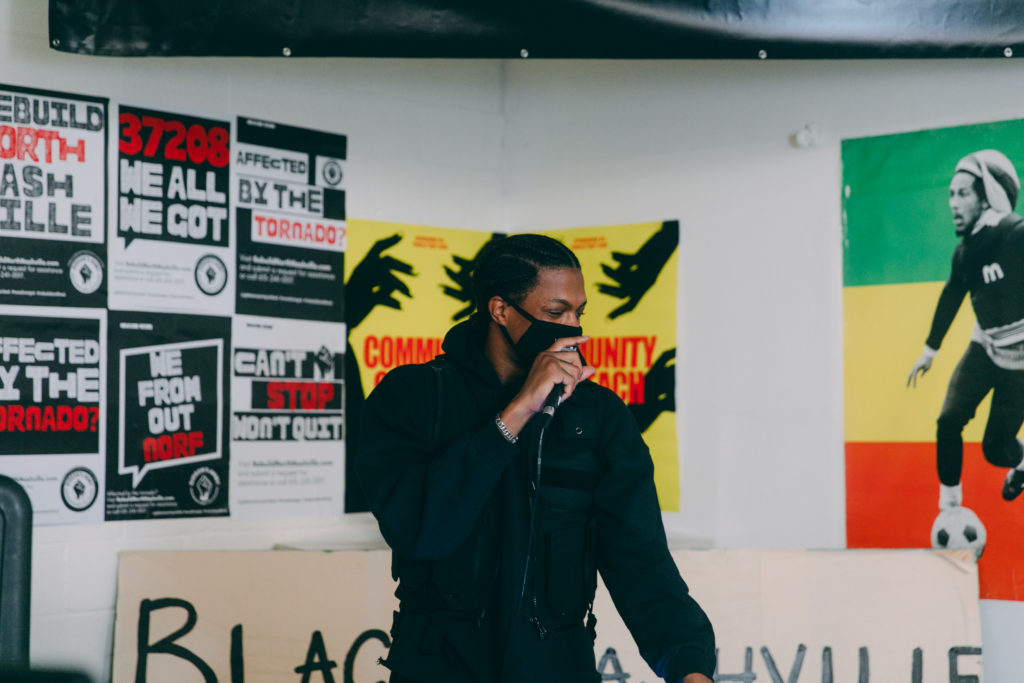
Black Nashville Assembly meetings are full of soulful musical performances — ideas on how to make democracy work for Black people and various people serving as hype men for all the vibes.
Eight organizations, including Nashville People’s Budget Coalition, Southerners on New Ground and Gideon’s Army, birthed the idea of the assembly early this summer, after realizing Black people weren’t showing up to their events.
The experienced organizers are strategizing to strengthen Black political power in the city and state. At their core, its all about making sure the government doesn’t harm or create barriers for Black people’s progress.
“Our issue with democracy right now in its current form in the United States is its fallen short for a lot of reasons,” Erica Perry, an organizer with Southerners on New Ground, said during an October meeting. “Much of it, we can point to capitalism, patriarchy and white supremacy.”
As the group crafts an agenda, organizers are nurturing a network of everyday Black folks to reshape local policy based on their problems and solutions.
The assembly is in the early stages but has already said public safety, housing and education are its top priorities.

Floss, with organizers Erica Perry and Jamel Campbell-Gooch, hosted the Black Nashville Assembly meeting in November.
Guiding Black residents
Although the meeting was on Zoom, Middle Tennessee State University senior Darrell Green says he still felt the energy.
“Everybody just giving their opinions from different point of views and like that was being respected,” Green says. “Because we all Black. But we were all coming from different communities within Nashville.”
In meetings, grassroots organizers are like tour guides. They ask questions to get everyone engaged, suggest solutions and strategize, but their main role is meeting residents where they are.
Green’s ideas for improving local institutions stem from his education at Martin Luther King Jr. Academic Magnet High School and riding the MTA.
He envisions an education curriculum that teaches how Black Americans have been change-makers, not passive bystanders. He also wants a transit system with more stops, coverings for riders and a way to connect the suburbs and city.
Right now, the assembly doesn’t have big bucks or a major in with local institutions. So their relationships with residents is their most valuable political tool.
Green is happy that the city is growing but not at the expense of Black natives.
“I want this place to be somewhere where Black people are heard. Black people are respected,” he says. “We got the same opportunities and accessibility to all the new things.”
He’s still trying to figure out how to get involved with the political system, which is exactly the type of person the assembly wants.
They’re unapologetically working with Black folks who know systemic racism exists. So, if you think you can outmaneuver racism by working hard and getting an education, it’s not for you.
“You might have been able to handle those situations,” long-time organizer Theeda Murphy says. “But why should you have to?”
Navigating internal and external challenges
Black Nashville Assembly organizers agree on the core problems but have different opinions on solutions.
Murphy thinks substantive change can come from within systems.
“We have the right to vote,” she explains. “Even though there are lots of laws now that keep a lot of us from voting. At one time, we didn’t have the right to vote and that was ultimately a political process.”
Once they’ve set an agenda, they’ll still have to be consistent in pressuring elected officials.
“The political establishment and a financial interest of Nashville can often withstand an initial surge of protests.” MTSU Associate Professor Sekou Franklin says. “Like we saw this summer. They can withstand it for a month to two months.”
Franklin is a member of Democracy Nashville, which is a part of the coalition, but he isn’t directly involved with assembly. He says to get long-term buy-in the movement needs an agenda that taps into Black people’s grievances.
And they’ll need it for what could be a David and Goliath fight with state lawmakers. The legislature has shown they’re willing to restrict Nashville’s bolder ideas.
Take marijuana laws. When Metro tried to give police more discretion, the state said local governments can’t create their own penalties on drug possession.
“The biggest issue with state legislature is they just intimidate the city officials and often the established advocacy groups,” he says.
He thinks this prevents the most marginalized groups from getting the help they need.
Setting the foundation
The Black Nashville Assembly is nurturing the relationships with people that’ve attended their events.
After that they’ll advocate for community participation for the city’s 2021 budget, work on political education and leadership to push the assembly’s agenda.
And they’re hoping to join a history book full of Nashville organizers that have pushed local governments to prioritize the demands of Black residents.
“One of the things that we want as Americans is to be free,” Murphy says. “To live our lives where we can develop ourselves and our families to our fullest extent. And not have anything holding us back other than our own abilities and our own drive. And I think that is what the cornerstone of American democracy is supposed to be.”

